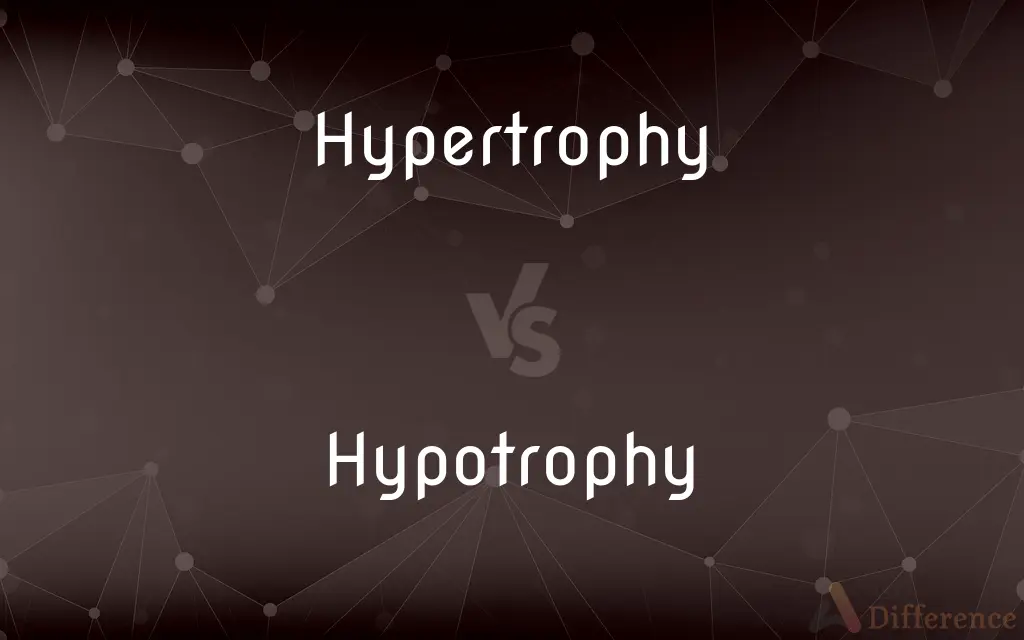Hypertrophy vs. Hypotrophy — What's the Difference?
By Maham Liaqat & Urooj Arif — Updated on March 31, 2024
Hypertrophy refers to the increase in the size of an organ or tissue through the enlargement of its cells, while hypotrophy signifies a decrease in size or underdevelopment of an organ or tissue.

Difference Between Hypertrophy and Hypotrophy
Table of Contents
ADVERTISEMENT
Key Differences
Hypertrophy is a term commonly associated with muscle growth, where through exercise or increased workload, muscle fibers grow in size, leading to stronger and larger muscles. This process is beneficial and often a goal in fitness and bodybuilding, as it enhances physical performance and appearance. On the other hand, hypotrophy describes a condition where an organ or tissue is underdeveloped or has decreased in size, which can be due to a lack of use, nutritional deficiencies, or underlying health conditions. Unlike hypertrophy, hypotrophy is generally considered undesirable as it can indicate poor health or a decreased ability to perform certain functions.
In the context of bodybuilding or physical training, hypertrophy is achieved through specific types of resistance training that focus on increasing muscle mass. This involves exercises that stress the muscles, leading to microtears in the muscle fibers, which then repair and grow stronger and larger. Conversely, hypotrophy in muscles can occur due to inactivity, such as when a limb is immobilized in a cast for a long period, leading to muscle wasting and a decrease in muscle size.
Nutritional intake plays a significant role in both hypertrophy and hypotrophy. Adequate protein and calorie intake are crucial for muscle hypertrophy, supporting the repair and growth of muscle fibers after exercise. Inadequate nutrition, on the other hand, can lead to hypotrophy, as the body lacks the necessary building blocks to maintain or increase tissue size.
Understanding the differences between hypertrophy and hypotrophy is essential for those involved in sports, fitness, and healthcare, as it aids in the development of training regimens, rehabilitation programs, and nutritional plans tailored to individual needs and goals. Recognizing the signs of hypotrophy can also prompt timely medical intervention to address potential underlying health issues.
Comparison Chart
Definition
Enlargement of cells leading to tissue growth
Decrease in size or underdevelopment of tissue
ADVERTISEMENT
Typical Context
Muscle growth, heart muscle thickening
Muscle wasting, organ underdevelopment
Desirability
Often desirable in muscles for strength and aesthetics
Generally undesirable, indicating potential health issues
Causes
Exercise, increased workload, physiological demand
Inactivity, nutritional deficiencies, disease
Impact on Health
Can be positive for muscles; potentially negative for prolonged cardiac hypertrophy
Indicates decreased functionality or health concerns
Nutritional Influence
Requires adequate protein and calories
May result from inadequate nutrition
Compare with Definitions
Hypertrophy
Involves balanced nutrition and targeted exercise regimes.
Achieving muscle hypertrophy requires a diet rich in protein and regimented strength training.
Hypotrophy
Indicates decreased functionality and health.
Hypotrophy of the muscles can lead to weakness and reduced physical performance.
Hypertrophy
Often observed in muscles subjected to regular resistance training.
The bodybuilder's arm hypertrophy was evident from his increased bicep size.
Hypotrophy
Often associated with disuse or undernutrition.
The unused limb developed hypotrophy due to lack of movement.
Hypertrophy
An increase in cell size leading to organ or tissue enlargement.
Years of weight training led to significant muscle hypertrophy in the athlete.
Hypotrophy
A reduction in cell size leading to decreased organ or tissue mass.
After being in a cast for months, his leg showed noticeable hypotrophy.
Hypertrophy
Can be beneficial or detrimental, depending on the context.
While muscle hypertrophy enhances physical strength, cardiac hypertrophy may pose health risks.
Hypotrophy
Targeted through rehabilitation and nutritional support.
Physical therapy and protein supplementation were used to counteract muscle hypotrophy.
Hypertrophy
Hypertrophy (, from Greek ὑπέρ "excess" + τροφή "nourishment") is the increase in the volume of an organ or tissue due to the enlargement of its component cells. It is distinguished from hyperplasia, in which the cells remain approximately the same size but increase in number.
Hypotrophy
Usually undesirable, signaling potential underlying health issues.
Hypotrophy in an organ can signify serious conditions requiring medical attention.
Hypertrophy
The enlargement of an organ or tissue from the increase in size of its cells
The hypertrophy of the muscle fibres
Hypotrophy
Progressive degeneration of an organ or tissue caused by loss of cells.
Hypertrophy
A nontumorous enlargement of an organ or a tissue as a result of an increase in the size rather than the number of constituent cells
Muscle hypertrophy.
Hypotrophy
A degeneration in the functioning of an organ due to the reduction of the volume of the cells
Hypertrophy
To grow or cause to grow abnormally large.
Hypertrophy
An increase in the size of an organ or tissue due to the enlargement of its individual cells.
Hypertrophy
Increase in muscle size through increased size of individual muscle cells; a result of weightlifting, and other exercise. It differs from muscle hyperplasia, which is the formation of new muscle cells.
Hypertrophy
To increase in size.
Hypertrophy
A condition of overgrowth or excessive development of an organ or part; - the opposite of atrophy.
Hypertrophy
Abnormal enlargement of a body part or organ
Hypertrophy
Undergo hypertrophy;
Muscles can hypertrophy when people take steroids
Common Curiosities
What are common signs of hypotrophy?
Common signs include visibly reduced muscle mass, weakness, and decreased functionality of the affected area or organ.
Can hypotrophy be reversed?
Yes, in many cases, hypotrophy can be reversed through targeted exercise, improved nutrition, and addressing underlying health conditions.
What causes muscle hypertrophy?
Muscle hypertrophy is caused by resistance training and physical stress that leads to muscle fiber microtears, followed by repair and growth.
How can I achieve muscle hypertrophy?
Muscle hypertrophy can be achieved through consistent resistance training, adequate protein intake, and sufficient rest and recovery.
What role does nutrition play in hypertrophy?
Nutrition is crucial for hypertrophy, providing the necessary building blocks for muscle repair and growth, especially protein and calories.
Does hypotrophy affect only muscles?
No, hypotrophy can affect any organ or tissue in the body, leading to underdevelopment or decreased size.
How is cardiac hypertrophy different from muscle hypertrophy?
Cardiac hypertrophy refers to the thickening of the heart muscle, often due to increased demand or high blood pressure, and can have negative health implications if it becomes prolonged.
Is hypertrophy always a sign of good health?
While muscle hypertrophy is generally positive, indicating strength and fitness, hypertrophy of organs like the heart can signal underlying health issues if prolonged.
Can all forms of exercise lead to hypertrophy?
Not all forms of exercise lead to hypertrophy. Resistance training focused on muscle stress and adaptation is most effective for this purpose.
What is the best way to prevent hypotrophy?
Preventing hypotrophy involves maintaining an active lifestyle, ensuring proper nutrition, and addressing any health conditions that may contribute to tissue underdevelopment.
Share Your Discovery

Previous Comparison
Determination vs. Faith
Next Comparison
Glabrous vs. SmoothAuthor Spotlight
Written by
Maham LiaqatCo-written by
Urooj ArifUrooj is a skilled content writer at Ask Difference, known for her exceptional ability to simplify complex topics into engaging and informative content. With a passion for research and a flair for clear, concise writing, she consistently delivers articles that resonate with our diverse audience.
















































